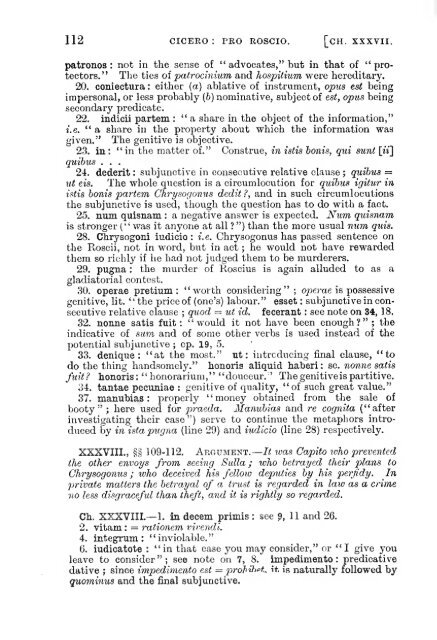Pro S. Roscio Amerino
Pro S. Roscio Amerino
Pro S. Roscio Amerino
Create successful ePaper yourself
Turn your PDF publications into a flip-book with our unique Google optimized e-Paper software.
"<br />
112 CICERO : PRO ROSCIO. [CH. XXXVII.<br />
patronos : not in the sense of " advocates," but in that of " protectors."<br />
Tho ties of patrocinium and hospitium were hereditary.<br />
20. coniectura: either (a) ablative of instrument, opus est being<br />
impersonal, or less probably (6) nominative, subject of est, opus being<br />
secondary predicate.<br />
22. indicii partem : " a share in the objeet of the information,"<br />
i.e. " a share iu the property about which the informatioa was<br />
given." The genitive is objective.<br />
2.3. in: "in the matter of." Construe, in istis bonis, qui sunt [ii]<br />
quibus . . .<br />
24. dederit : subjunctive in cousecutive relative clause quibus =<br />
;<br />
ut eis. The whole question is a circumlocution for quibus igitur in<br />
istis bonis partem Chrysogonus dedit ?, and in such circumlocutions<br />
the subjunctive is used, though the question has to do with a fact.<br />
25. num quisnam : a negative answer is expected. Num quisnam<br />
'<br />
is stronger ( ' was it anyone at all ? ") than the more usual num quis.<br />
28. Chrysogoni iudicio : i.e. Chrysogonus has passed sentence on<br />
the Roscii, not in word, but in act ; he would not have rewarded<br />
them so riclily if lie had not judged them to be murderers.<br />
29. pugna : the murder of Roscius is again alluded to as a<br />
gladiatorial contest.<br />
30. operae pretium : "worth considering" ; ope?-ae is possessive<br />
genitive, lit. '<br />
' the price of (ono's) labour. " esset : subjunctive in consecutive<br />
relative clause quod = ut id. fecerant : see note on 34, 18.<br />
;<br />
3'2. nonne satis fuit : "would it not have been enough?" ; the<br />
indicative of simi and of some other verbs is used instead of the<br />
potential subjunctive ; cp. 19, 5.<br />
33. denique : "at the most." ut: intrcducing final clause, "to<br />
do the thing handsomely." honoris aliquid haberi: sc. nonne satis<br />
fuit? honoris: "honorarium," "douceur.' Tliegenitiveispartitive.<br />
34. tantae pecimiae : genitive of quality, "of such great value."<br />
37. manubias : properly "money obtained from the sale of<br />
booty " ; here used for praeda. Manubias and re cognifa ("after<br />
investigating their case") serve to continue the metaphors introduced<br />
by m istapugna (line 29) and iudicio (line 28) respectively,<br />
XXXVIII., §§ 109-112. Argument.— It ivas Capito tvho prevented<br />
the other envoys from seeing Sulla ; who betraycd their plans to<br />
Chrysogonus ; luho deceived his fellow deputies by his perjidy. In<br />
private matters the beti-ayal of a trust is regarded in law as a crime<br />
no less disgraceful than theft, and it is rightly so regarded.<br />
Ch. XXXVIII.— 1. In decem primis : see ?, 11 and 26.<br />
2. vitam : = rationem vivendi.<br />
4. integrmn " : inviolable.<br />
6. iudicatote : "in that case you may consider," nr "I give you<br />
leave to consider"; see note on 7, 8. imjpedimento : predicative<br />
dative ; since impedimento est — j^rohihet.. it. ia naturally followed by<br />
quo7ninu8 and the final subjunctive.

















